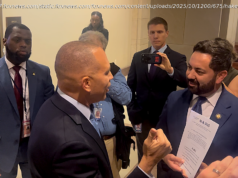WASHINGTON – U. S. Supreme Court Justices Ruth Bader Ginsburg and Antonin Scalia agreed on opera, wine, travel destinations — and not much else. They held polar opposite views on everything from gun rights to same-sex marriage, yet their friendship endured decades of…
WASHINGTON – U. S. Supreme Court Justices Ruth Bader Ginsburg and Antonin Scalia agreed on opera, wine, travel destinations — and not much else.
They held polar opposite views on everything from gun rights to same-sex marriage, yet their friendship endured decades of fierce debate over matters deeply affecting the country.
Their cordiality earned them Allegheny College’s annual award for civility in public life.
Justice Ginsburg and the family of the late Justice Scalia accepted the award Monday, just hours after Justice Scalia’s replacement was sworn into office, capping a drawn out confirmation that stretched the boundaries of civility.
“We are in a dangerous chapter of American political discourse” in which “the reflexive demonization of political adversaries is on the rise,” college President James H. Mullen said Monday.
Former Pennsylvania Gov. Tom Ridge, the nation’s first secretary of homeland security, lamented that, too. He recalled years he spent in Congress that were marked by fierce but respectful exchanges of firmly held opinions.
“When did we forget that a strong democracy champions diversity of thought and embraces tolerance of the other person’s point of view?” he asked. “Civility is the balm for rigorous debate and dialogue and disagreement, and it really is the bridge to problem solving.”
Justice Ginsburg noted that members of the high court begin each argument day with handshakes — 32 by the time each has shaken the hand of everyone else. That’s a symbol, she said, of the respect the justices have for each other and for the court.
“At my workplace, collegiality really matters,” she said.
Eugene Scalia said his father, the late justice, wasn’t especially known for civility, but he did understand that views are formed through the respectful exchange of ideas, and that was important to him.
“There is nothing wrong with strongly held convictions. My father certainly had a few, and Justice Ginsburg had them, too,” Mr. Scalia said. “My father did not like people to be wishy-washy. To him, if an issue was important enough then it was worth investing in, understanding thoroughly, and having an informed opinion on.”
Mr. Mullen said the justices were chosen for the award because their respect for each other transcended ideology, and that is what democracy demands.
“Each stands as a hero to those who hold their respective judicial philosophies, and each has argued passionately and poignantly for their beliefs. Yet amid those differences they forged a friendship grounded in mutual respect,” he said. “As they debated with each other, they also listened to each other, they admired the rigor that the other brought to argument, and they admired the quality of the other’s mind.”
There is too little of that in government now, he said.
“Our experiment in government works best when our public servants engage each other and each others’ ideas with openness and respect,” he said. “The empathy that should grow from shared service to country and each of these fundamental premises is now at risk.
About 150 alumni, staff and friends of the college attended the presentation at the National Press Club.
The college created the prize in 2011 to shine a light on moments in public life that highlight the kind of civility that belongs in everyday public discourse. Mr. Mullen said he hopes these examples will counterbalance the less civil moments that are becoming normalized, and to inspire Allegheny students and others toward civic engagement.
Past recipients are U. S. Sen. John McCain, R-Ariz. and former Vice President Joe Biden; U. S. Sens. Dianne Feinstein, D-Calif., and Lindsey Graham, R-S. C.; journalists David Brooks and Mark Shields; the women of the U. S. Senate. In 2015 the college recognized a moment rather than individuals. The presentation paid tribute to former Montgomery, Ala., police Chief Kevin Murphy’s gesture in 2013 when he removed his badge and handed it to U. S. Rep. John Lewis, D-Ga., as a symbol of contrition for his department’s treatment of Mr. Lewis and other civil rights activists in 1961.
Justice Ginsburg called on the lawmakers among them to lead their colleagues toward civility in Congress.
“Let us hope that they — and others of goodwill — will lead in restoring harmonious work ways,” she said.
Allegheny College in Meadville, Pa., is one of the nation’s oldest liberal arts colleges and is home to the Center for Political Participation.






